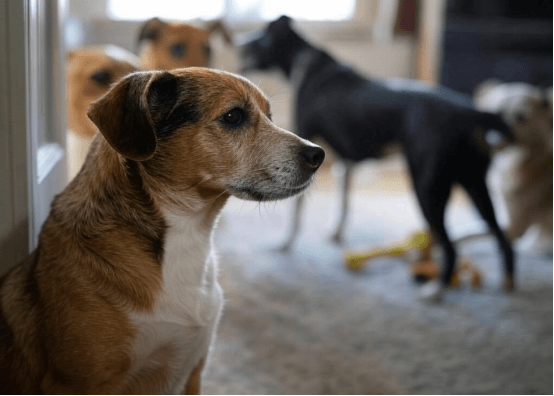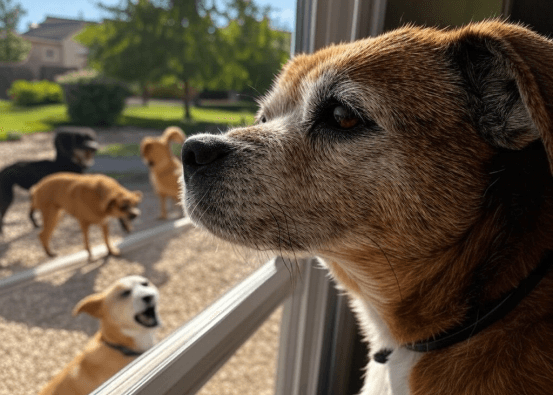If Your Pet Suffers from Anxiety or Separation Problems: Science Can Help
Pet animals are not just our housing companions; they are parts of our daily lives, making us happy with their greetings and gentle touches. But, there is one big problem: many pets are scared and lonely, especially when we leave them alone, and it's slowly killing them. I found a PetMD survey from 2025, which stated that the searches for 'pet anxiety' had increased by 35%, which was quite surprising to me. It became worse after the pandemic, because our pets had been used to having us at home all the time, and now that life has gone back to normal, they are depressed when they are alone. It isn't just the pets who feel it though, it makes us feel stressed, keeps the neighbours annoyed, and even makes us feel guilty as owners. You can clearly tell from the nonstop barking and the shredded furniture what is going on. Let's find out what is going on with some concrete numbers, stories from other pet owners, and some practical suggestions to help our furry friends to feel calm again.
What is Pet Anxiety? Let's Find Out the Causes and Signspet anxiety is the most typical type of anxiety in pets, and it means that the animal experiences great discomfort when the owner is away. The American Veterinary Medical Association notes 14% of pets, especially dogs, develop symptoms due to intense attachment phenomena. Benny, a three-year-old Corgi in Seattle, developed his owner Claire when she had to go back to office in 2024 after being a work from home employee for several years. He started shredding shoes, barked incessantly, and weighed 5% less than he should. “His vet linked it to anxiety induced appetite loss” shares Claire.
The triggers are quite diverse:
Changes in environment: This includes changes in the family structure, moving to a new home or changing the daily schedule after the pandemic. Socialization gaps: Hand raised puppies and kittens who have had limited exposure to the world are prone to stress. Physiological factors: Anxiety increases the levels of cortisol (the stress hormone) by 20%in affected pets as found by the 2025 AVMA research.
Dr. Emily Carter, a veterinary behaviorist, explains: “Pets consider owners as the'secure base,' and thus, when separated from them, experience panic-like symptoms.” 。

Social Media: A Curse or a Blessing? It Depends on the Situation. There are many communities where people with anxious pets feel helpless, and these platforms become a war zone. In early 2025, r/petparents on Reddit reported a 45% increasein posts about separation anxiety, and X.com, the new Twitter, has 30% more posts related to #PetAnxiety. A post on a Reddit thread showed a Golden Retriever tearing up the couch during the workday and got over 200 responses with advice like “start with five-minute absence” and “use puzzle feeders.”
In 2024, the #PetMentalHealth hashtag on Instagram exploded, and it has been great to see so many people, especially other pet owners, posting about it. One story that I really like is about Luna, a Maine Coon cat who used to spend most of her day hiding under the bed. Today, she is wandering around the house like she owns the place. Her owner Mia documented Luna's improvement in a video that went viral 50k times. It didn't just stop there – other pet parents were coming in sharing how their pets are doing, totally inspired by Luna. Mia described the situation perfectly when she said, “It was really helpful to watch other pets get better for Luna.” It's quite heartwarming to see how these shared moments can bring encouragement and show how much pets can improve. It is wonderful to see that kind of community support.
Nevertheless, there is a flip side to all this sharing; there is a lot of information out there that has not been tested in any way. You will discover that many people are recommending'natural remedies' such as CBD oil, but many of them have not been tested. It is an easy thing to do. That's why vets like Dr. Carter always say, “Hey, before you even decide to try anything new, you should talk to your vet about it.” It is just safer to consult a professional.
Recognizing Anxiety: From Chaos to Quiet DespairAnxiety symptoms can be almost anything:
Destruction: Chewing on doors and shredding furniture.
Vocalization: Barking or howling without a break. Self-harm: From over-grooming to completely bald spots.
Withdrawal: Hiding, not eating.
Benny, Claire's three-year-old Corgi, is a perfect example of the toll it takes: his endless barking had the neighbors complaining, while his shredded sneakers became a daily occurrence. “I felt like I was in a trap, I was guilty for leaving and stressed for coming back,” she admits.
The effects are not only confined to the pets:
53% of owners feel anxious (according to a PetMD survey in 2024). 27% said it affects their work output. Long term effects: The immune system is compromised, the digestive tract is weakened.
Science-Based Solutions: A Systems Approach1. Behavior Modification
Systematic Desensitization: Slowly expose pets to being alone. His Shiba Inu, Kiko, had a carpet chewing problem, and Denver resident Mark helped him with 5-minute departures, which increased every week. Kiko was able to tolerate 2 hour absence without destroying anything in weeks 6-8. Counterconditioning: Associate positive outcomes with being alone. According to Claire,'Benny stays calm, and I leave salmon treats behind.'
2. Environmental Enrichment
Safe Zones: Make them feel secure with familiar smells. Miami cat owner Olivia provided a blanket lined nook with classical music for her anxious Ragdoll Tina. Tina stopped hiding in a few weeks. Interactive Toys: Food puzzles, electric laser toys.
3. Medication (Short-Term) Vets may recommend anti-anxiety medications like clonazepam for severe cases. Hannah used 0.5mg daily doses for her Border Collie Rusty, together with training. “He barked half as much in a month, she says.
4. Lifestyle Adjustments
Exercise: Houston's Nathan brought back his Golden Retriever Leo's appetite with nightly 30-minute runs.
Routine: Set up routine for feeding and walking to minimize guess work.
Success Stories: From Panic to PeaceCase 1: German Shepherd Rex. Rex experienced anxiety when his owner Julia returned to work after cuddling him during the pandemic. Using desensitization (beginning with 10-minute absences) and chicken rewards, he can now handle 4 hour solitude. Julia continues, “Patience did change our story.”
Case 2: Maine Coon Bella. The new pet made Bella afraid of the other pets. Using a catio with climbing shelves and 30 minute feather wand sessions, owner Peter created a separate place for him. Three months later, she gets along well with the family dog.
Case 3: Labrador Sunny. Sunny had anxiety due to overfeeding with cheese snacks, and his owner, Sophie, changed his 800 calorie/day meals. His weight returned to normal two months later, and his anxiety disappeared. “One of the problems was diet,” Sophie notes.
Online Communities: A Collection of WisdomFrom January to December 2025, r/dogs had 40% more posts about anxiety, and people shared tips like a diffuser for anxiety and a'calming playlist. PetMD reports that 10% of owners seek advice from forums. It was a telehealth vet that Ellen thanked for her dog's 70% symptom improvement: “Online support saved us.”

Action Plan: Your Pet: Some Strategies.
Assess Severity: Hints for the levels of severity; Moderate symptoms? Try behavior training. Severe? Ask your vet about medication. Taking Care of Your Pet.
Watch Your Pet Closely and Record Any Changes in His/Her Behavior It may be helpful to try and write down how your pet is doing once a month, and any changes in their behaviour. Change doesn't happen overnight; it takes time for pets to adapt to new environments. It took about six weeks for Mark's dog Kiko to get better, or Rusty to get his act together.
What's Coming Up in Pet Care : There is some new and interesting stuff coming up, for example applications that can help to determine your pet's mood and provide them with training tips that are tailored specifically to them. Dr. Carter said, “I think tech is going to change the way we look at our pets' mental health.”
Conclusion: There is No Need for Your Pet to Be Anxious. As owners, we know what needs to be done: Read their cries, be consistent, and seek help from other people. In the end, a calm pet is simply a happier and a healthier pet that is able to form stronger and longer bonds with the people it loves the most.
